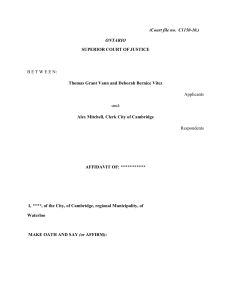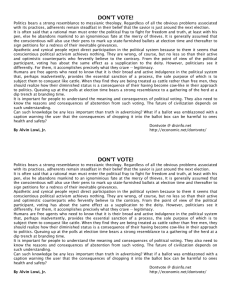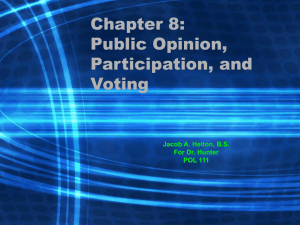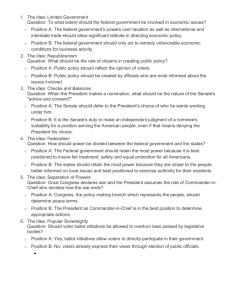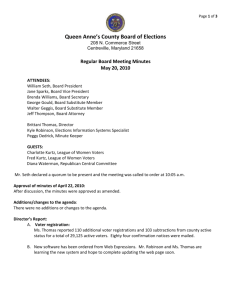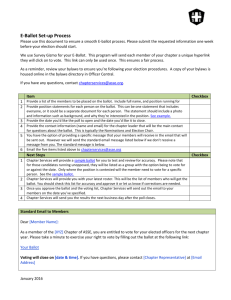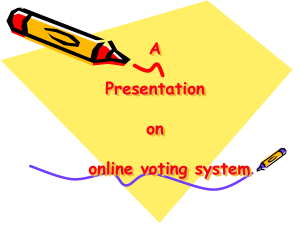VaVV_Recommendations
advertisement
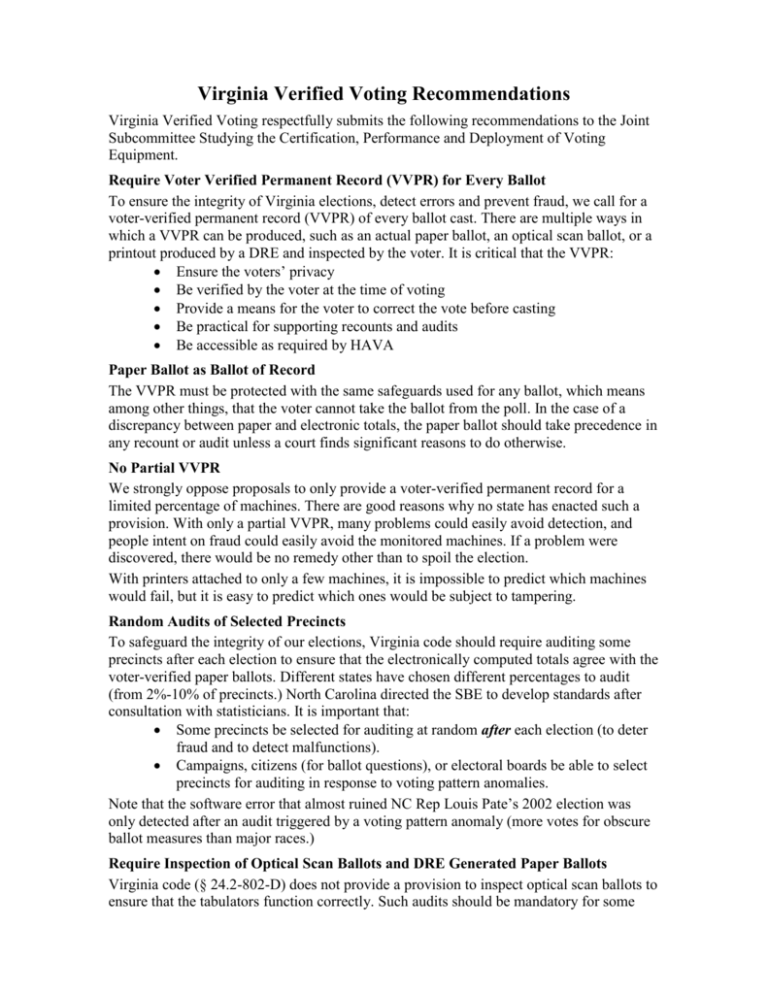
Virginia Verified Voting Recommendations Virginia Verified Voting respectfully submits the following recommendations to the Joint Subcommittee Studying the Certification, Performance and Deployment of Voting Equipment. Require Voter Verified Permanent Record (VVPR) for Every Ballot To ensure the integrity of Virginia elections, detect errors and prevent fraud, we call for a voter-verified permanent record (VVPR) of every ballot cast. There are multiple ways in which a VVPR can be produced, such as an actual paper ballot, an optical scan ballot, or a printout produced by a DRE and inspected by the voter. It is critical that the VVPR: Ensure the voters’ privacy Be verified by the voter at the time of voting Provide a means for the voter to correct the vote before casting Be practical for supporting recounts and audits Be accessible as required by HAVA Paper Ballot as Ballot of Record The VVPR must be protected with the same safeguards used for any ballot, which means among other things, that the voter cannot take the ballot from the poll. In the case of a discrepancy between paper and electronic totals, the paper ballot should take precedence in any recount or audit unless a court finds significant reasons to do otherwise. No Partial VVPR We strongly oppose proposals to only provide a voter-verified permanent record for a limited percentage of machines. There are good reasons why no state has enacted such a provision. With only a partial VVPR, many problems could easily avoid detection, and people intent on fraud could easily avoid the monitored machines. If a problem were discovered, there would be no remedy other than to spoil the election. With printers attached to only a few machines, it is impossible to predict which machines would fail, but it is easy to predict which ones would be subject to tampering. Random Audits of Selected Precincts To safeguard the integrity of our elections, Virginia code should require auditing some precincts after each election to ensure that the electronically computed totals agree with the voter-verified paper ballots. Different states have chosen different percentages to audit (from 2%-10% of precincts.) North Carolina directed the SBE to develop standards after consultation with statisticians. It is important that: Some precincts be selected for auditing at random after each election (to deter fraud and to detect malfunctions). Campaigns, citizens (for ballot questions), or electoral boards be able to select precincts for auditing in response to voting pattern anomalies. Note that the software error that almost ruined NC Rep Louis Pate’s 2002 election was only detected after an audit triggered by a voting pattern anomaly (more votes for obscure ballot measures than major races.) Require Inspection of Optical Scan Ballots and DRE Generated Paper Ballots Virginia code (§ 24.2-802-D) does not provide a provision to inspect optical scan ballots to ensure that the tabulators function correctly. Such audits should be mandatory for some precincts in every election, and especially in a recount. Current code simply requires that that the tabulator tape be inspected, or that the ballots be run through the tabulator again. Thus Virginia has no protection against tabulator errors of any kind (accidental or intentional) – even in the case where paper ballots exist. The type of error (and incorrect result) that happened in NC Rep Louis Pate’s 2002 election would not have been detected in Virginia. That is not because software errors cannot occur, but because Virginia procedures do not even check for tabulator errors. The fact that Virginia does not have straight party options on the ballot unfortunately does not prevent other kinds of software errors. No wireless communication ability for voting equipment We call in the strongest possible terms for an absolute ban on all wireless communication features on voting equipment – whether by RF, IR or any other means. Any such features must be permanently physically disabled, not simply turned off by software. Using a card key to enable a software switch does not physically disable the capability. Wireless communication is simply too great a security risk to outweigh any minimal benefit it may provide election workers. For example, wireless communication devices could be used to launch a denial of service attack at key precincts, or to allow an adversary with inside access to completely defeat logic and accuracy tests – by triggering a hidden software feature to become active on election day. Testing is Not Sufficient Testing is an important step for producing reliable systems. However, testing cannot guarantee the absence of errors. The tabulators in the North Carolina 2002 election had not only been tested, but certified. The machines that failed in Carteret County in 2004 and lost over 4000 votes had likewise been tested and certified. The lever machine that lost votes in Hanover Grove precinct during Virginia’s 2004 Republican primary had presumably been tested in prior elections. Testing simply cannot prevent all errors. We need additional safeguards. In addition, testing is vulnerable to an adversary with inside access to the software source code. An insider (such as a programmer employed by a vendor) could easily defeat testing by providing instructions to alter votes that require some signal to be activated. The signal could be a special write-in ballot, key stroke combination, or wireless signal among other techniques. Such an adversary could pass every single logic and accuracy test, but still alter an election without leaving any trace. Finally testing must be repeated in its entirety for every single change to the software, operating system or environment. Uncertified (and untested) software patches have been used in Georgia and California in violation of state election laws. VVPR can provide an important safeguard if a vendor ever attempts such shortcuts in Virginia. No Paperless Electronic Poll Books We oppose electronic pollbooks (as allowed by § 24.2-611) because of the risk that a pollbook error or alteration could deny voters the opportunity to vote unconditionally, or allow voters to vote multiple times without leaving any kind of audit trail. We do support providing technology to election officers that allows them to easily direct voters to their correct polling location in cases where voters are not listed in the pollbook. We commend the State Board of Elections for providing a form on their web site that allows voters to find their polling location in a way that preserves voter’s privacy. We also commend the electoral boards of those counties, including Fairfax and Loudoun, which provide computer supported assistance to direct voters to the correct precinct. Transition Costs and Technology Recommendations We recognize that Virginia will face one-time costs by requiring VVPR, but strongly believe that the benefits of preserving the integrity of our elections far outweigh any costs. Several studies have found that precinct-based optical scan technology is much less expensive than DREs over time. It is also a very reliable technology with few components that can fail during an election. By contrast, printers attached to DREs have reliability questions that need to be carefully addressed – although they are much preferable to DREs without printers. If DREs must be used, we recommend against reel-to-reel print systems because of privacy and recount concerns. We encourage the committee to offer legislation that encourages or even mandates that jurisdictions use precinct-based optical scan machines. The most conservative engineering approach would be to require some form of paper ballots, such as precinct based optical scan balloting, and forbid DREs altogether. We suggest that the committee consider the example of the North Carolina legislature earlier this year. North Carolina directed their SBE to issue an RFP for precinct-based optical scan tabulators which will be available to counties at the price obtained statewide. Counties may then obtain state funds up to a limit intended to cover the cost of purchasing precinct based optical scan machines, along with AutoMark type devices for disabled voters. In North Carolina, counties are free to spend their own additional funds if they choose to purchase more expensive technology. Most of the electronic voting machines purchased by Virginia jurisdictions are really general purpose computers with touch screen interfaces. By installing different software, they could potentially be converted to other uses to further reduce transition costs. No Grandfather Clause We understand that jurisdictions may need a reasonable, but not unlimited, amount of time to implement VVPR, but we strongly oppose any attempt to avoid implementing VVPR by allowing existing DREs to persist indefinitely as “facts on the ground”. The sanctity of the ballot is far more important than any costs or inconvenience of changing voting systems. Summary Virginia Verified Voting appreciates the opportunity to present the views of our members, and many other Virginia citizens, to the committee. We urge you to issue a strong call for voter-verified permanent records of all ballots, random post-election audits, updated recount procedures, and a ban on all wireless communication devices on voting equipment. The bipartisan Commission on Federal Election Reform, known as the Carter-Baker Commission, recently called for a law “requiring that all voting machines be equipped with a voter-verified paper audit trail.” Twenty six states now require VVPR, and fourteen others are considering VVPR. Virginia should provide its citizens the same protection. People gave their lives to ensure our right to vote. We urge you to take every possible measure to safeguard the integrity of Virginia’s elections by demanding voter-verified permanent records of every single ballot.
